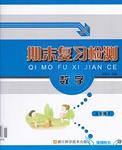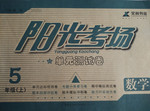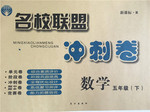题目内容
Where were you just now?
-- At ___________.
A. the Mr. Green’s B. Greens C. Mr. Green’s D. the Greens

 期末复习检测系列答案
期末复习检测系列答案 超能学典单元期中期末专题冲刺100分系列答案
超能学典单元期中期末专题冲刺100分系列答案 黄冈360度定制密卷系列答案
黄冈360度定制密卷系列答案 阳光考场单元测试卷系列答案
阳光考场单元测试卷系列答案 名校联盟冲刺卷系列答案
名校联盟冲刺卷系列答案An old woman had two large pots, one on each end of a pole. She carried the pole with the pots across her neck.
One of the pots had a crack in it while the other pot was perfect and always delivered a full pot of water. At the end of the long walk from the well to the house, the cracked pot arrived only half-full.
For two years this happened daily, with the woman bringing home only one and a half pots of water. Of course, the perfect pot was proud. But the poor cracked pot was ashamed of its own imperfection.
One day, the cracked pot spoke to the woman by the well: “I am ashamed of myself because this crack in my side causes water to leak out all the way back to your house.”
The old woman smiled: “Did you notice that there are flowers on your side of the path, but not on the other pot’s side? That’s because I have always known about your crack, so I planted flower seeds on your side of the path. And every day while we walk back, you water them.”
“For two years I have been able to pick these beautiful flowers to decorate the table. Without you being just the way you are, I would not have this beauty.”
Each of us has our own cracks. But it’s these cracks that make our lives together so interesting and meaningful.
【小题1】What does the underlined word “crack” mean?
| A.Very narrow space between two things or two parts of something. |
| B.Line of division where something is broken, but not into separate parts. |
| C.Fault in an idea, system, or organization. |
| D.Sudden sharp noise like the sound of a stick being broken. |
| A.Proud. | B.Disappointed. | C.Annoyed. | D.Embarrassed. |
| A.On both sides of the path. | B.In the woman’s house. |
| C.On the perfect pot’s side of the path. | D.On the cracked pot’s side of the path |
① The woman picked the flowers and decorated the table.
② The woman told the truth to the cracked pot.
③ The cracked pot talked to the woman about its crack.
④ The woman found a crack on one pot.
⑤ The woman planted some flower seeds.
| A.④⑤①③② | B.⑤④③②① |
| C.④③①②⑤ | D.④⑤③①② |
| A.Never laugh at imperfection. | B.No pains, no gains. |
| C.Imperfection makes life meaningful. | D.It’s never too late to learn. |
By the year 1869 when the first transcontinental railroad was finished, over 350,000 pioneers had taken the Oregon Trail to head west and start a new life, which is known as the Gold Rush Period in American history. Many of these were women and most were accompanied by children.
Before heading west, many women often spent their day doing nothing more than visiting, needlework, and the occasional gardening of flowers. Others were not from as wealthy families and had to work alongside their men as laborers. Neither type was in most cases prepared for the hardships that lay ahead. 
Once they did reach their destination, the work was far from over. A house would need to be built. Women quickly learned to use all kinds of tools right alongside their husbands. At the first sign of spring, a garden would need to be planted. Pioneer women also had to deal with dangerous wild animals, including bears and lions. Indians were also a concern, and some did fall to their deaths by the Indians’ hand. Where were the men when all this was being done? Working the fields and mining were the two most usual occupations. Their remaining work, which there was plenty of, fell to the women and the oldest children if there were any.
Women who headed west learned quickly that there was much more to life than teas and visiting. They had no choice but to struggle for survival. This was their life.
【小题1】What is the passage mainly about?
| A.Changes in the Gold Rush Period. |
| B.New life in the West. |
| C.Great people in American history. |
| D.Pioneer women to the West. |
| A.it was a real struggle for women to adapt to the hard life in the West |
| B.it was not reasonable for women to give up their comfortable life |
| C.it was a better choice for women to experience a new and hard life |
| D.it was necessary for women to change their lifestyle completely |
| A.They had no choice but to throw away many of their beloved things. |
| B.They could not take their children along because of the hard journey. |
| C.It was common that they lost their husbands in some accidents. |
| D.They suffered from diseases or even lost their lives. |
| A.building a house |
| B.planting a garden |
| C.driving wild animals away |
| D.caring for the Indians |